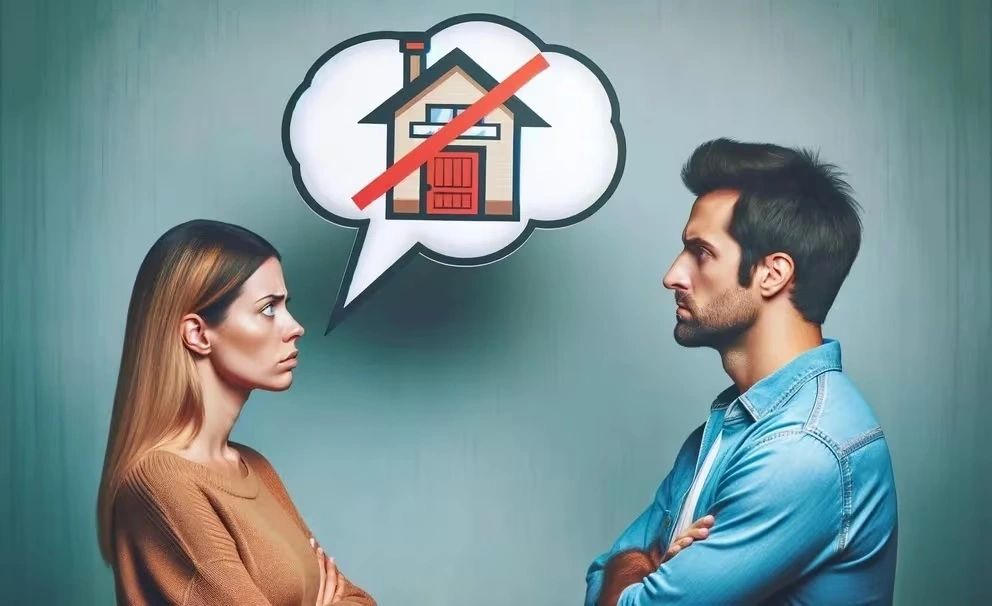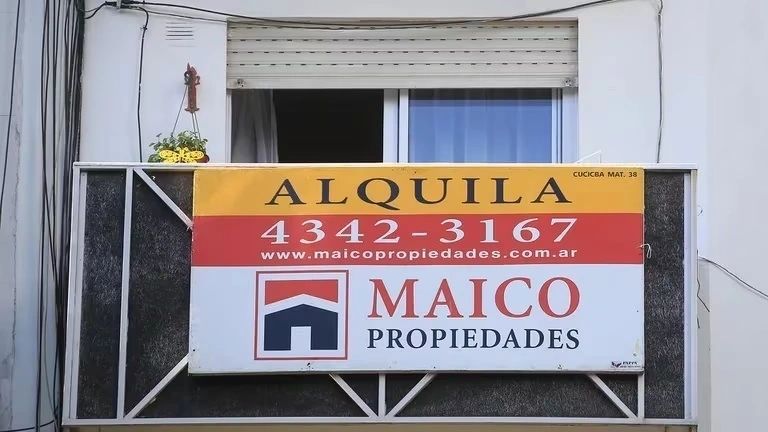BuySellBA
Administrator
Rents and the Chainsaw Plan: In the midst of a stagnant market, what will happen to prices after the devaluation
December 14, 2023
Those trying to renew contracts, such as those looking for homes, have an increasingly difficult scenario in the face of a shortage that has worsened in recent weeks. What could be the increase after the economic announcements
By José Luis Cieri

The devaluation, they understand in the sector, will result in a 40% increase in values in the coming days (Illustrative Image Infobae)
The jump in the price of the dollar that was announced on Tuesday will undoubtedly impact the traditional housing rental market. Renewing contracts and finding properties amid a severe supply shortage will become an even more complex task.
The devaluation, they understand in the sector, will result in a 40% increase in values in the coming days. A three-room apartment, which until yesterday had a cost of $300,000 per month in the city of Buenos Aires, would now cost around 420,000 pesos.
Another blow to the pockets of tenants who have been desperately searching for a long time because this situation that was already in crisis will worsen.
Since the Rental Law came into effect in 2020, the supply has decreased to the present where it is almost zero in 3 and 4 room units. It is even easier to get proposals for two rooms and studio apartments (they do not go below $180,000 today) both in CABA and in other cities in the country.
And the values although they rose more than 220% year-on-year, now with the devaluation and the era of the president of the Nation, they would make it more difficult to find housing at a reasonable price for the budgets managed by Argentine wage earners with back salaries and below the inflationary level.economic shock measures announced by the Minister of Economy Luis Caputo ongoing, the Javier Milei
Vanesa Ibarra, from Salguero Propiedades, told Infobae that “the devaluation will hit harder on rental values. We are facing a scenario of stagnation. The situation remains very similar to that of last year, although Milei said that the law had to be repealed, the owners know that it is something that will take time. Her victory did not move the owners' standards when it came to whether or not to put an apartment up for rent. In the future we believe that the situation will continue as before: very little supply, very high demand and exorbitant prices.”
A tenant whose contract for a two-room apartment expired and was paying $160,000 until December 1, started paying $320,000 these days and had to accept it because she had started looking for housing 4 months ago and couldn't find anything in the Palermo neighborhood. Situation that is similar in other layouts and with other values.
Diego Frangella, president of the Buenos Aires Real Estate Professional College, told Infobae that “it is very small the percentage of new contracts that are currently signed. The reality is that, in the current context, the market is in absolute stagnation, without agreements being made under the conditions stipulated by the recently modified law (in force since October 18).”

Rental signs are impossible to detect both in CABA and in other cities in the country. Informality grew to make contracts
The few contracts in force are made for three years and semi-annual adjustments through Casa Propia, an index that did not satisfy the owners and that makes the increases lower than through the Rental Contract Index that was in effect until October.
“It is important to reaffirm the position of real estate professionals regarding the tremendous error that the use of the Own Home Index means, which has an increase of half the inflation, discouraging owners from allocating their units to the market,” added Frangella.
"What we always recommend to the tenant is that if they are already in an apartment and have to negotiate a renovation, it is going to be in their best interest to stay; today, going out to look for a new property to move into with everything that that implies, is almost an impossible mission. Some owners told us that they will wait if Milei maintains its intention to repeal the law and have the contracts once again governed by the Civil and Commercial Code. On the other hand, there are those who have had empty apartments for several months and do not want to continue covering the expenses of the apartment with money from their pockets, so they decided to go out on the market to at least obtain a minimum income,” said Ibarra.
The repeal of the new Rental Law is expected as a central point, both from Buenos Aires chambers and from the Federal Council of Real Estate Associations (Cofeci).
Frangella concluded: “We are very few steps away from reaching zero offer. As a consequence of the lack of real estate and inflation, values rise day by day. The extensions are actually being carried out and, in fact, they are the only movement that the housing rental market shows.”
www.buysellba.com
December 14, 2023
Those trying to renew contracts, such as those looking for homes, have an increasingly difficult scenario in the face of a shortage that has worsened in recent weeks. What could be the increase after the economic announcements
By José Luis Cieri

The devaluation, they understand in the sector, will result in a 40% increase in values in the coming days (Illustrative Image Infobae)
The jump in the price of the dollar that was announced on Tuesday will undoubtedly impact the traditional housing rental market. Renewing contracts and finding properties amid a severe supply shortage will become an even more complex task.
The devaluation, they understand in the sector, will result in a 40% increase in values in the coming days. A three-room apartment, which until yesterday had a cost of $300,000 per month in the city of Buenos Aires, would now cost around 420,000 pesos.
Another blow to the pockets of tenants who have been desperately searching for a long time because this situation that was already in crisis will worsen.
Since the Rental Law came into effect in 2020, the supply has decreased to the present where it is almost zero in 3 and 4 room units. It is even easier to get proposals for two rooms and studio apartments (they do not go below $180,000 today) both in CABA and in other cities in the country.
And the values although they rose more than 220% year-on-year, now with the devaluation and the era of the president of the Nation, they would make it more difficult to find housing at a reasonable price for the budgets managed by Argentine wage earners with back salaries and below the inflationary level.economic shock measures announced by the Minister of Economy Luis Caputo ongoing, the Javier Milei
Vanesa Ibarra, from Salguero Propiedades, told Infobae that “the devaluation will hit harder on rental values. We are facing a scenario of stagnation. The situation remains very similar to that of last year, although Milei said that the law had to be repealed, the owners know that it is something that will take time. Her victory did not move the owners' standards when it came to whether or not to put an apartment up for rent. In the future we believe that the situation will continue as before: very little supply, very high demand and exorbitant prices.”
The modification of the update period through the Casa Propia coefficient for contracts in pesos did not have the expected effect on the market and the supply remains low, it is estimated that it has already fallen by close to 80% year-on-year in CABA
A tenant whose contract for a two-room apartment expired and was paying $160,000 until December 1, started paying $320,000 these days and had to accept it because she had started looking for housing 4 months ago and couldn't find anything in the Palermo neighborhood. Situation that is similar in other layouts and with other values.
Diego Frangella, president of the Buenos Aires Real Estate Professional College, told Infobae that “it is very small the percentage of new contracts that are currently signed. The reality is that, in the current context, the market is in absolute stagnation, without agreements being made under the conditions stipulated by the recently modified law (in force since October 18).”

Rental signs are impossible to detect both in CABA and in other cities in the country. Informality grew to make contracts
The few contracts in force are made for three years and semi-annual adjustments through Casa Propia, an index that did not satisfy the owners and that makes the increases lower than through the Rental Contract Index that was in effect until October.
“It is important to reaffirm the position of real estate professionals regarding the tremendous error that the use of the Own Home Index means, which has an increase of half the inflation, discouraging owners from allocating their units to the market,” added Frangella.
Greater informality
Experts recognize that in recent weeks informal agreements between owners and tenants have grown directly."What we always recommend to the tenant is that if they are already in an apartment and have to negotiate a renovation, it is going to be in their best interest to stay; today, going out to look for a new property to move into with everything that that implies, is almost an impossible mission. Some owners told us that they will wait if Milei maintains its intention to repeal the law and have the contracts once again governed by the Civil and Commercial Code. On the other hand, there are those who have had empty apartments for several months and do not want to continue covering the expenses of the apartment with money from their pockets, so they decided to go out on the market to at least obtain a minimum income,” said Ibarra.
The repeal of the new Rental Law is expected as a central point, both from Buenos Aires chambers and from the Federal Council of Real Estate Associations (Cofeci).
Frangella concluded: “We are very few steps away from reaching zero offer. As a consequence of the lack of real estate and inflation, values rise day by day. The extensions are actually being carried out and, in fact, they are the only movement that the housing rental market shows.”
www.buysellba.com

